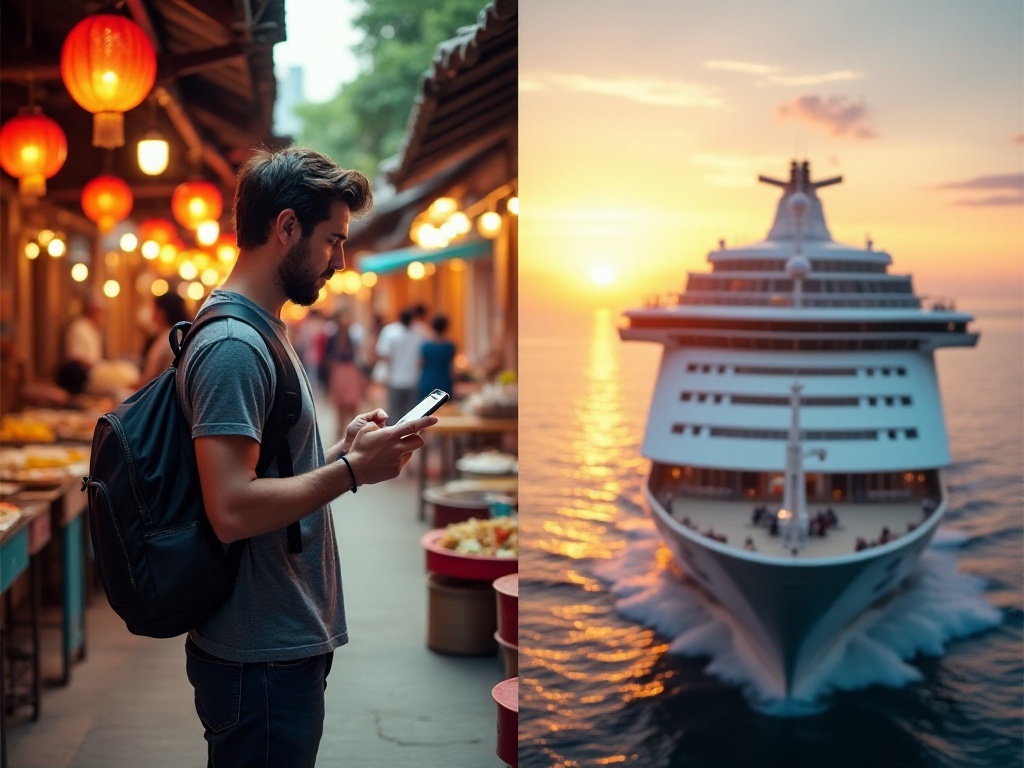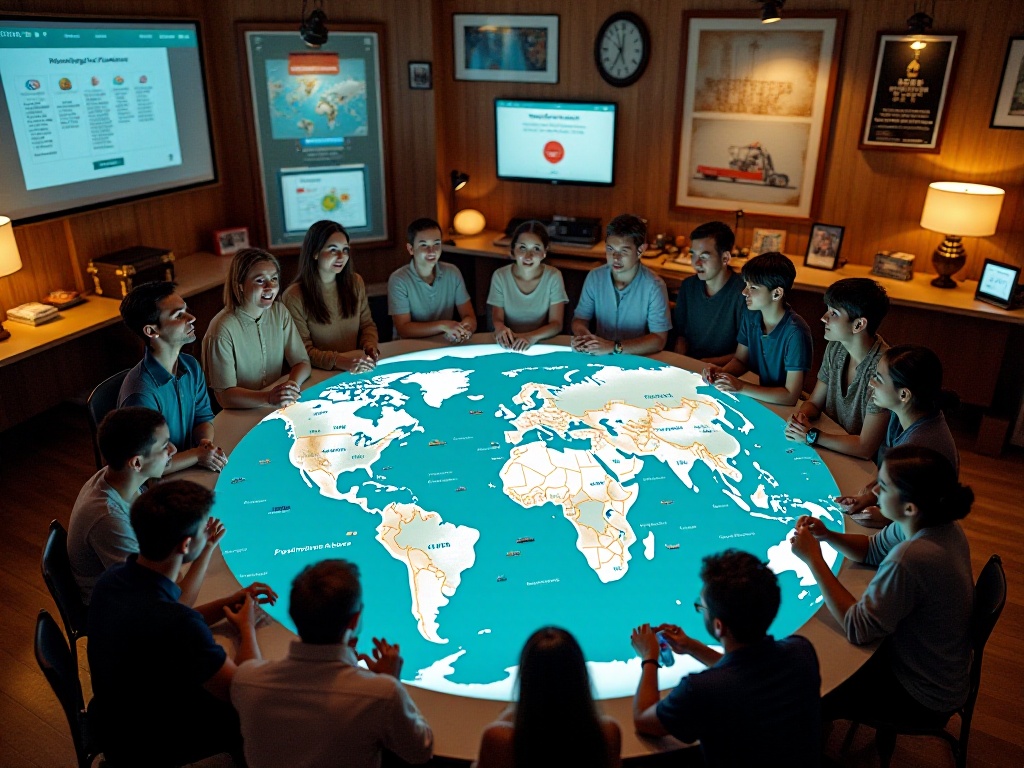Opening Thoughts
Hey everyone! As a traveler who has explored far and wide, I really want to share my years of experience with you. To be honest, when I first started traveling, I was quite a mess - my wallet would always end up empty, and I even had to ask my parents for emergency funds. Looking back, it's quite embarrassing! But after numerous attempts and reflections, I've finally found my own budget planning method, which I'd like to share with you today.
First Step in Budgeting
First, we need to calculate how much money we actually have to spend, right? I learned this the hard way - I used to impulse spend whenever I saw others' travel photos, and by the end of the month, I couldn't even afford instant noodles. Now I always calculate my monthly fixed expenses first: rent 2000, utilities 200, phone bill 100, daily meals 1500, plus some miscellaneous expenses, totaling around 4000 in fixed monthly expenses.
If you're like me, an average worker with a monthly salary of 6000, then you can probably budget around 2000 for travel each month. Doesn't sound like much? Don't worry, this amount is actually enough for planning a nice short trip! Take a weekend trip to Wuhan for example: round-trip flights 600 (buying discounted tickets a month in advance), two nights' accommodation 600 (choosing a good value homestay), the remaining 800 is plenty for exploring Hubuxiang and visiting the Yellow Crane Tower.
Destination Research
Speaking of choosing destinations, it's really fascinating! I once spent a month in Southeast Asia and only spent 8000 on food, accommodation, transportation, and attraction tickets. But a friend of mine spent over 20,000 in Sanya for just one week, staying in five-star hotels and taking drone photos! So choosing the right destination is crucial.
I love browsing travel guides on Xiaohongshu and Mafengwo to see how locals enjoy their city. For instance, in Chiang Mai, local-recommended night market snacks only cost about 20 yuan per meal, while restaurants in tourist areas easily cost 200+ for a meal. Now I particularly enjoy finding out where locals go - it's not only cheaper but also more authentic.
Another tip is to check the local price index. I have a habit of checking the prices of bottled water and instant noodles at chain convenience stores like 7-11 or FamilyMart. The price differences in these daily necessities actually reflect the consumption levels of different cities. For example, in Japan, a bottle of water might cost 200 yen (about 12 yuan), while in Vietnam it might only cost 10,000 dong (about 3 yuan).
Major Expenses
Let's talk about the biggest expenses - flights and accommodation. Last summer when I went to Europe, I really put in some effort. The round-trip flight cost over 5000, and that was after hunting for special deals for two whole months. During peak season, it could easily cost 8000 or more if you book randomly.
For accommodation, I used a great strategy: staying in hostels for the first few days to meet friends, then booking guesthouses together with like-minded travelers I met. This way, 15 days of accommodation only cost a bit over 3000, averaging around 200 per night. Plus, I'm still in touch with the friends I met at the hostels!
I think location is the most important factor when booking accommodation. In Barcelona, I booked a hostel very close to a metro station. Although it was cheaper than those in the city center, the convenient transportation saved money that I could spend on several authentic paella meals!
Also, it's crucial to read reviews, especially from Asian travelers. Our accommodation requirements might differ from European and American tourists - we tend to care more about room cleanliness and shower water pressure and temperature.

Daily Expenses
Daily expenses are the easiest to exceed! I've now developed a good habit of keeping track of expenses. In Paris, my daily expenses were roughly like this: breakfast from the supermarket with a croissant and coffee, 5 euros; lunch at a nice local restaurant, 15-20 euros; dinner possibly with new friends at a restaurant, 25-30 euros. For transportation, a weekly pass averaged to 8 euros per day, and attraction tickets varied from 15-20 euros depending on the itinerary.
But there were pleasant surprises too! For instance, I discovered that many museums in Paris extend their opening hours on Thursday evenings with discounted tickets. The Louvre's evening atmosphere was amazing, with fewer tourists and no queues for photos.
Another money-saving tip is buying snacks and drinks from supermarkets. The first thing I do in a new place is locate the nearest supermarket to buy fruits, bread, and drinks. This not only saves money, but browsing supermarkets is also an interesting experience where you can see many local specialty products.

Emergency Preparations
Regarding emergency preparations, I've learned many lessons the hard way! Once in Chiang Mai, Thailand, I suddenly developed a high fever of 39°C and had to go to the hospital in the middle of the night. Although medical costs in Thailand are cheaper than in China, registration, examination, and medicine still cost nearly 2000 yuan. If I hadn't set aside emergency funds, I would have had to call home for help.
Since then, I always reserve 20% of my budget for emergencies. For example, with a 10,000 budget, I ensure 2000 is readily available. I distribute this money across different places: some cash, some in credit cards, and some in Alipay or WeChat Wallet. This way, I can always find a solution in real emergencies.
Also, travel insurance is a must! Travel insurance is quite affordable nowadays and can be incredibly helpful in crucial moments. Previously in Japan, when my flight was delayed due to a typhoon, the insurance company reimbursed my accommodation and flight change fees, saving me several thousand yuan.

Budget Execution
Plans without execution are just empty talk. I now use the Wanderlog APP for expense tracking - it's super useful! You can record expenses offline, automatically convert different currencies, and most importantly, sync edits with travel companions.
Every night before bed, I spend about ten minutes recording the day's expenses. If I exceed the budget, I immediately plan adjustments, like having breakfast at the supermarket the next day or walking instead of taking the metro. This not only helps control the budget but also makes the entire journey more organized.
I also like using Excel for budget planning, listing out each day's expected expenses clearly. The first column is for dates, followed by categories like accommodation, dining, transportation, admission tickets, and shopping. Recording daily actual expenses and comparing them with the budget makes it easy to spot where money is being overspent.

Money-Saving Tips
After many trips, I've gathered quite a few money-saving tricks. First, regarding accommodation, I really don't recommend staying in hotels alone - it's too wasteful! Hostels are a great choice, and nowadays they have pretty good conditions. I once stayed in a boat-house hostel in Amsterdam that only cost 150 yuan per night, but it was located right on a canal in the city center - sitting on the deck watching stars at night was incredibly romantic!
If traveling with friends, I strongly recommend renting entire apartments. In Kyoto, I rented a Japanese-style apartment with three friends, costing just over 200 per person per night, with private bathrooms and a kitchen. Most importantly, we could drink beer and chat in the living room at night - that feeling was really great.
There are many ways to save on transportation too. In Tokyo, I bought a Suica card (Pasmo card), which not only made metro rides cheaper but could also be used at convenience stores and vending machines. The London Oyster card is similar - it has a daily spending cap, after which no more charges are made, automatically giving you the best deal.
Attraction tickets offer lots of opportunities for savings. Many cities' museums have free admission times, like the Musée d'Orsay in Paris which is free on the first Sunday of each month. Student cards and youth cards can also be very useful - many European attractions offer discounts for people under 26. In Rome, I used my student card to buy a Roma Pass, which allowed unlimited access to attractions like the Colosseum and Pantheon for three days, much cheaper than buying individual tickets.
Food is also a significant expense. My suggestion is to prioritize your meals differently throughout the day. Breakfast from the supermarket, lunch at popular local restaurants, and dinner can be a bit more luxurious. In Paris, I would have a croissant and coffee for breakfast, set menu at small restaurants for lunch, and only go to Michelin-recommended restaurants for dinner. This way, you can taste authentic food without breaking the bank.

Closing Thoughts
Honestly, travel budgeting is truly an art. It's not just about numbers, but about understanding the essence of travel. Sometimes budget constraints can lead us to discover more interesting places and experience more authentic local life.
For instance, staying in hostels led to meeting friends from around the world, taking buses instead of taxis showed me more city scenery, and shopping at local markets rather than just eating in tourist areas gave me a taste of real local life. These experiences have made my travels much more colorful.
The most important aspect of travel isn't how much money you spend, but who you meet, what you experience, and what you learn. A carefully budgeted backpacking trip might give you more memorable experiences than a luxury guided tour.
I hope sharing my experiences can help you better plan your budget for your next trip. Remember, even a small budget can create an amazing journey - the key is to feel with your heart and plan with your mind.
Do you have your own unique budgeting insights? Or any unexpected gains from your travels? Share them with me! Let's create more beautiful memories together on the road.




